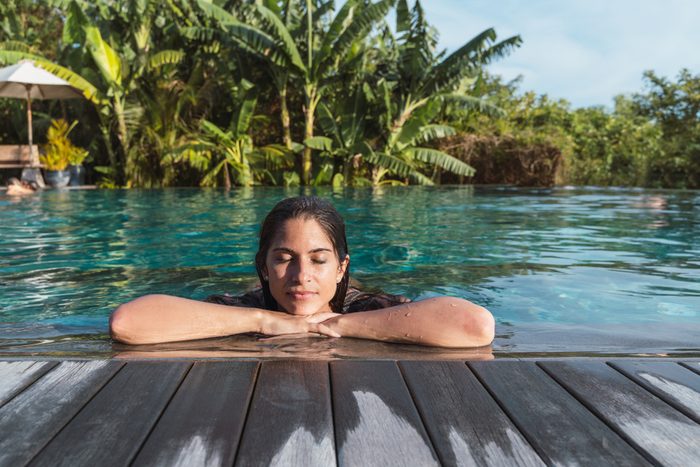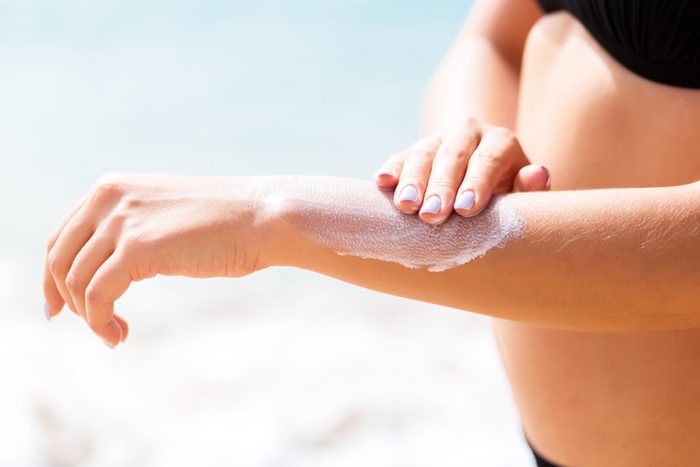
Among advanced economies around the world, the US stands out in one troubling way, according to The Center for Economic and Policy Research. The center refers to America as the “No Vacation Nation” with a workaholic culture that contributes to increased stress levels, lower well-being, and physical health problems like heart disease, says Joyce Marter, LCPC, licensed psychotherapist and author of The Financial Mindset Fix: A Mental Fitness Program for an Abundant Life.
“Not taking vacations means we are perpetually on the hamster wheel of work and life responsibilities,” Marter says. Lacking any break from our daily routines can cause us to live unconsciously, staying stuck in jobs or relationships that are no longer a good fit for us. On the other hand, vacationing encourages a range of health benefits, with research showing time off can actually help you live longer.
And while we’re all for scheduling that getaway of your dreams, the benefits of taking time off don’t necessarily require geographic travel, explains Erin Engle, PsyD, a psychologist at NewYork-Presbyterian/Columbia University Irving Medical Center. “Any form of a break can be beneficial, as time off represents physical and emotional time away from life’s routines,” Dr. Engle explains.
What Is ‘Secondhand Stress’? Here’s What It Means, Plus 5 Ways to Manage

1. What a vacation does for your nervous system
Studies show that vacations work to reduce stress by removing people from the activities and environments they associate with stress and anxiety, Dr. Engle says. “The results on physical and mental health are clear as more cortisol, more stress, the physical toll of exhaustion, in some cases lack of sleep, in addition to mental taxation, can result in low mood and burnout.”
She adds that the positive effects of planned breaks have been shown to last beyond the duration of the vacation.

2. What a vacation does for your heart
Research consistently shows that vacation is not just good for the soul—it supports a healthy heart. A 2019 public health study found that taking more frequent breaks from work lowers our risk of metabolic syndrome, a cluster of symptoms such as high cholesterol, high blood sugar, and high blood pressure—that work together to contribute to heart disease.
Even a one-week vacation, particularly if it includes some sort of exercise, has been shown to improve well-being, sleep quality, and autonomic regulation of heart rate, says Gioia Turitto, MD, a cardiologist at NewYork-Presbyterian Brooklyn Methodist Hospital. “Although any vacation is better than no vacation, longer vacations, defined as more than three weeks of annual time off, may be associated with less risk for cardiac deaths.”

3. What a vacation does for your waistline
Taking more time off work may help with better weight management, too. Research shows that ongoing stress can worsen our metabolic health, explains Rekha Kumar, MD, Chief Medical Officer at weight care program, Found, and practicing endocrinologist in New York City. “This is because there is a strong connection between stress and inflammation,” Dr. Kumar explains. “Chronic stress can lead to overeating, weight gain, and increased visceral adiposity, or fat associated with the organs.”
Dr. Kumar says it can be great to treat yourself while on holiday (smaller Italian portions of pasta and gelato are so satisfying!). However, especially if you go the all-inclusive route, be mindful not to go overboard on decadent meals and high-calorie cocktails.

4. How vacation affects your chronic disease risk
Dr. Kumar explains: “If we are chronically stressed and our cortisol continues to be high, both blood sugar and blood pressure will stay high, which are two key components of metabolic syndrome.”
Research, such as one 2021 study, shows this constant state of stress raises your risk of not just heart disease, but also diabetes, obesity, various cancers, and mood disorders, like anxiety and depression.
Can Stress Cause High Blood Pressure? What Heart Doctors Need You to Know

5. What vacation does to your brain
“Cognitive flexibility, or the brain’s ability to think creatively about problem-solving or adapt to new, changing, or unplanned events, can be harnessed or strengthened by vacations and break periods because we get the benefit of detaching from a more typical view of work life and our personal lives,” Dr. Engle explains. Training this part of our brain can do wonders for our mental health, “given that we can think differently—or even hold different assumptions about our lives or a situation when we have the space or capacity to think differently,” she says.
Greater cognitive flexibility is also associated with a lower risk of Parkinson’s disease, Alzheimer’s disease, and unhealthy weight gain. In addition, vacation time leads to increased productivity, focus, motivation, and goal-oriented behavior once we get back to our normal lives, Dr. Engle says.
Neurology Professors Just Listed the 9 Worst Habits for the Human Brain

6. What a vacation does for your skin
There’s scientific truth behind that post-vacation glow. Chronic stress shows up on our skin in the form of inflammatory breakouts, redness and sensitivity, dryness, and flare-ups of conditions like eczema, rosacea, or psoriasis, says Kemunto Mokaya, MD, FAAD, a board-certified dermatologist in Texas. Cortisol—the stress hormone—is also associated with accelerated aging, she explains. “When too much of it is released, it starts breaking down collagen and elastin, essential proteins that maintain skin elasticity and firmness. This can lead to the formation of wrinkles, fine lines, and sagging skin.” She adds that stress also affects blood flow and oxygen delivery to the skin, often responsible for a dull, tired complexion.
Still, while letting your worries melt away does wonders for your skin, it’s important to protect your complexion from potential holiday stressors. Make sure to wear plenty of sunscreen, cleanse effectively, drink enough water to maintain skin hydration, and nourish your skin with healthy foods, Dr. Mokaya says.
Stay healthy at home or on holiday with The Healthy @Reader’s Digest newsletter and follow The Healthy on Facebook, Instagram, and Twitter. Keep reading:

